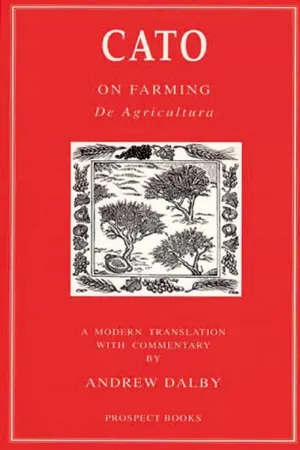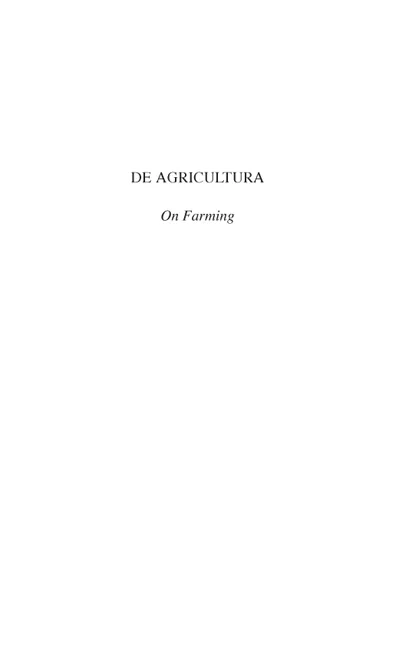
This is a test
- 248 pages
- English
- ePUB (mobile friendly)
- Available on iOS & Android
eBook - ePub
Book details
Book preview
Table of contents
Citations
About This Book
The first recipes to have survived in Latin, from the 2nd century BC, it is a particularly important resource. Cato wrote the earliest surviving complete work of Latin prose literature. It was this treatise: a book of instruction about the cultivation of vines, olives and fruit, the management of slaves and contract labour, the rituals consequent on ownership and even cookery for humans and the pharmacy.
Frequently asked questions
At the moment all of our mobile-responsive ePub books are available to download via the app. Most of our PDFs are also available to download and we're working on making the final remaining ones downloadable now. Learn more here.
Both plans give you full access to the library and all of Perlego’s features. The only differences are the price and subscription period: With the annual plan you’ll save around 30% compared to 12 months on the monthly plan.
We are an online textbook subscription service, where you can get access to an entire online library for less than the price of a single book per month. With over 1 million books across 1000+ topics, we’ve got you covered! Learn more here.
Look out for the read-aloud symbol on your next book to see if you can listen to it. The read-aloud tool reads text aloud for you, highlighting the text as it is being read. You can pause it, speed it up and slow it down. Learn more here.
Yes, you can access Cato on Farming by Marcus Cato, Andrew Dalby in PDF and/or ePUB format, as well as other popular books in Art & Culinary Arts. We have over one million books available in our catalogue for you to explore.
Information
Topic
ArtSubtopic
Culinary Arts
Est interdum praestare mercaturis rem quaerere nisi tam periculosum sit, et item fenerari, si tam honestumsit.* Maiores nostri sic habuerunt et ita in legibus posiuerunt, furem dupli condemnari, feneratorem quadrupli; quanto peiorem ciuem existimarint feneratorem quam furem, hinc licet existimare. 2. Et uirum bonum quom laudabant, ita laudabant: bonum agricolam bonumque colonum; amplissime laudari existimabatur qui ita laudabatur. 3. Mercatorem autem strenuum studiosumque rei quaerendae existimo, uerum, ut supra dixi, periculosum et calamitosum; 4. at ex agricolis et uiri fortissimiet milites strenuissimi gignuntur, maximeque pius quaestus stabilissimusque consequitur minimeque inuidiosus, minimeque male cogitantes sunt qui in eo studio occupati sunt. Nunc, ut ad rem redeam, quod promisi institutum principium hoc erit.
1 Praedium quom parare cogitabis, sic in animo habeto:uti ne cupide emas, neue opera tua parcas uisere, etne satis habeas semel circumire; quotiens ibis, totiensmagis place bit quod bonum erit. 2. Vicini quo pactoniteant id animum aduertito: in bona regione benenitere oportebit. Et uti eo introeas et circumspicias utIInde exire possis.
I. QVOMODOAGRVM EMI PARARIQVE OPORTEAT.
Preface
Trading can sometimes bring success, but it is insecure; so can money-lending, but that is not respectable. So our forefathers thought; and so they enacted that a thief should pay any penalty twice over, a money-lender four times over, which allows us to infer how much worse a citizen they thought a money-lender was than a thief.1 When they wanted to say that a man was good, their highest compliments were to call him ‘a good farmer and a good husbandman’. I believe that a trader may display bravery and skill in the course of trade, but, as I said above, it is insecure and liable to disaster. As to farmers, their offspring are the strongest men and bravest soldiers; their profit is truest, safest, least envied; their cast of mind is the least dishonest of any. This is sufficient preface: now to my subject.
Buying and Developing a Farm
Selecting the Property
1. When thinking of running a farm, always remember: do not buy on a whim, take the trouble to visit, do not suppose a single look will be enough. If it is a good property, then the more you go, the happier you will be. Notice the looks of the neighbours. In a good district, they ought to look well. And while you visit and inspect, leave yourself a way out.
Vti bonum caelum habeat; ne calamitosum siet; solo bono, sua uirtute ualeat. 3. Si poteris, sub radice montis siet, in meridiem spectet, loco salubri. Operariorum copia siet bonumque aquarium; oppidum ualidum prope siet, aut mare, aut amnis qua naves ambulant, aut uia bona celebrisque. 4. Siet in his agris qui non saepe dominos mutant; qui in his agris praedia uendiderint, quos pigeat uendidisse. Vti bene aedificatum siet: caueto alienam disciplinam temere contemnas; de domino bono colono bonoque aedificatore melius emetur. Ad uillam cum uenies, uideto uasa torcula et dolia multane sient; 5. ubi non erunt, scito pro ratione fructum esse. Instrumenti ne magni siet; loco bono siet! uideto quam minimi instrumenti sumptuosusque ager ne siet. 6. Scito idem agrum quod hominem: quamvis quaestuosus siet, si sumptuosus erit, relinqui non multum. 7. Praedium quod primum siet si me rogabis, sic dicam: de omnibus agris optimoque loco iugera agri centum, uinea est prima, uel si uino multo est, secundo loco hortus irriguus, tertio salictum, quarto oletum, quinto pratum, sexto campus frumentarius, septimo silua caedua, octauo arbustum, nono glandaria silua.
It must have good weather; it must not be liable to storms. It must thrive from its own excellence and from its good location: if possible, it should be at the root of a mountain,2 south-facing, in a healthy position. There must be plenty of labour and a good water supply. There must be a sizeable town nearby, or the sea, or a river used for traffic, or a good and well-known road.3 It should be one of the properties that is not always changing its owners, and whose sellers regret having had to sell.
It should have good buildings: never carelessly dismiss another’s expertise. It is better to buy from a good husbandman and a good builder.4 When you come to the farm buildings, check that there are plenty of presses and vats 5 (remember that the lack of them means a lack of produce) but not too much farm equipment. It is to be in a good position: see that it is not wasteful, and requires the least possible equipment. A property, like a man, may bring money in, yet be so wasteful that little is left.
If you ask me what would make a farm the first choice, I will say this: varied ground, a prime position and a hundred iugera;6 then, first the vineyard (or an abundance of wine), second an irrigated kitchen garden, third a willow wood, fourth an olive field, fifth a meadow, sixth a grain-field, seventh a plantation of trees, eighth an orchard, ninth an acorn wood.7
2 Pater familias, ubi ad uillam uenit, ubi larem familiarem salutauit, fundum eodem die, si potest, circumeat; si non eodem die, at postridie. Vbi cognouit quo modo fundus cultus siet, operaque quae facta infectaque sient, postridie eius diei uilicum uocet; roget quid operis siet factum, quid restet, satisne temperi opera sient confecta, possitne quae reliqua sient conficere, et quid factum uini, frumenti aliarumque rerum omnium. 2. Vbi ea cognouit, rationem inire oportet operarum, dierum; si ei opus non apparet, dicit uilicus sedulo se fecisse, seruos nonualuisse, tempestates malas fuisse, seruos aufugisse, opus publicum effecisse; ubi eas aliasque causas multas dixit, ad rationem operum operarumque uilicum reuoca! 3. cum tempestates pluuiae fuerint,
II. PATRIS FAMILIAS OFFICIA.
Directing the Business
2. Each time as master you visit the farm, you must first greet the Lar of the Household.8 Then go round the property – that day, if you can; if not that day, the next. As soon as you are clear how the business stands, what tasks are done and still to do, next day you should send for the manager and ask him how much of the work is finished, how much remains, whether what is done was done in time and there will be time to do the rest, and how it is with the wine, the grain and everything else singly.
When you have this straight, you can get down to calculating people and days’ work.9 If the work seems wanting the manager will say that he has done his best, slaves were sick, the weather was bad, slaves ran away or were requisitioned for public works: when he has put these and all his other arguments, bring him back to the calculation of workers and their work! If there was quae opera per imbrem fieri potuerint: dolia lauari, picari, uillam purgari, frumentum transferri, stercus foras efferri, stercilinum fieri, semen purgari, funes sarciri, nouos fieri, centones, cuculiones familiam oportuisse sibi sarcire; 4. per ferias potuisse fossas ueteres tergeri, uiam publicam muniri, uepres recidi, hortum fodiri, pratum purgari, uirgas uinciri, spinas eruncari, expinsi far, munditias fieri; cum serui aegrotarint, cibaria tanta dari non oportuisse. 5. Vbi cognita aequo animo sint quae reliqua opera sint, curare uti perficiantur; rationes putare argentariam, frumentariam, pabuli causa quae parata sunt, rationem uinariam, oleariam, quid uenierit, quid exactum siet, quid reliquum siet, quid siet quod ueneat; quae satis accipiunda sint, satis accipiantur;6. reliqua quae sint uti compareant; si quid desit in annum, uti paretur; quae supersint ut ueneant; quae opus sint locato locentur; quae opera fieri uelit et quae locari uelit, uti imperet
rainy weather, what work could have been done while it rained? — washing and pitching vats, cleaning farm buildings, shifting grain, shovelling dung, making a dung-heap, threshing grain, mending ropes and making new ones; the slaves could have been patching their own cloaks and hoods.10 On holidays they should have cleaned out blocked ditches, mended the public road,11 cut back hedges, dug the vegetable garden, cleared the meadow, cut sticks, pulled out brambles, husked the emmer, tidied up.12 While slaves were ill they ought not to have been given as much food.
When it is clear without dispute what work lies ahead, you must arrange for it to be done. You must check the figures for money and grain, check what is set aside for fodder, check the wine and oil figures — what is already sold, and the income from this, what is still to be produced, and what it will fetch — agree the difference and take charge of the agreed sum.
You must take stock; order to be bought whatever will be needed during the year; order to be sold whatever will be surplus; order to be contracted whatever needs contracting. You must give verbal orders on work that you want done and work that you want et ea scripta relinquat; pecus consideret; 7. Auctionem uti faciat: uendat oleum, si pretium habeat; uinum, frumentum quod supersit uendat; boues uetulos,armenta delicula, oues deliculas, lanam, pelles, plostrum uetus, ferramenta uetera, seruum senem, serum morbosum, et si quid aliut supersit, uendat. Patrem familias uendacem, non emacem esse oportet.
III. AVCTIONEM VTI FACIAT.
3 Prima adulescentia patrem familiae agrum conserere studere oportet. Aedificare ...
Table of contents
- Cover
- Dedication
- Title
- Copyright
- Contents
- Introduction
- Illustrations
- On Farming
- Bibliography
- Index